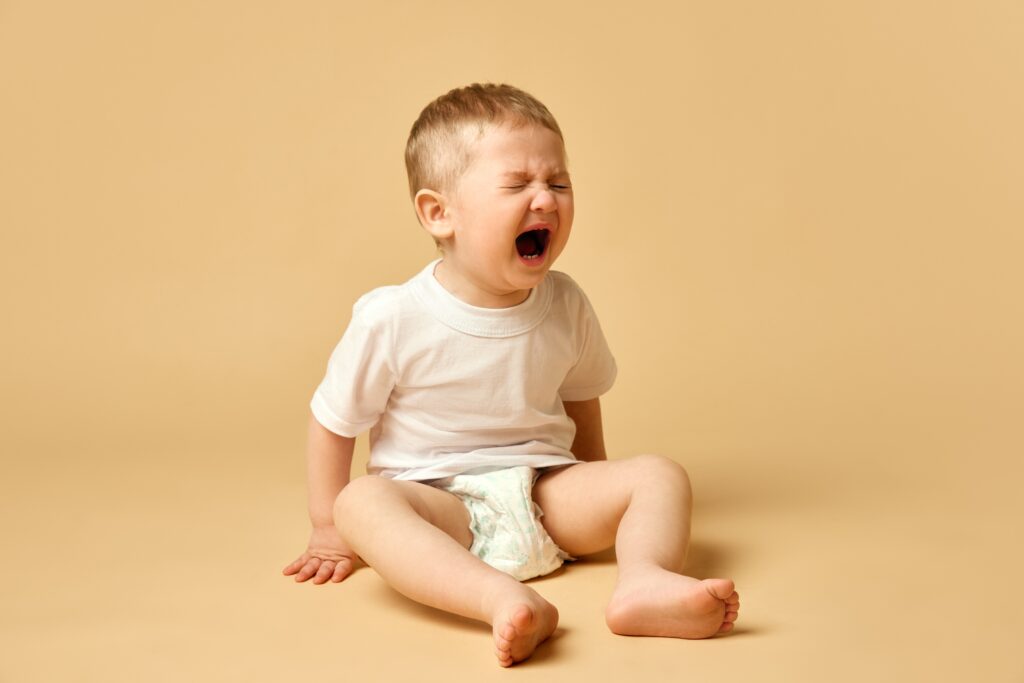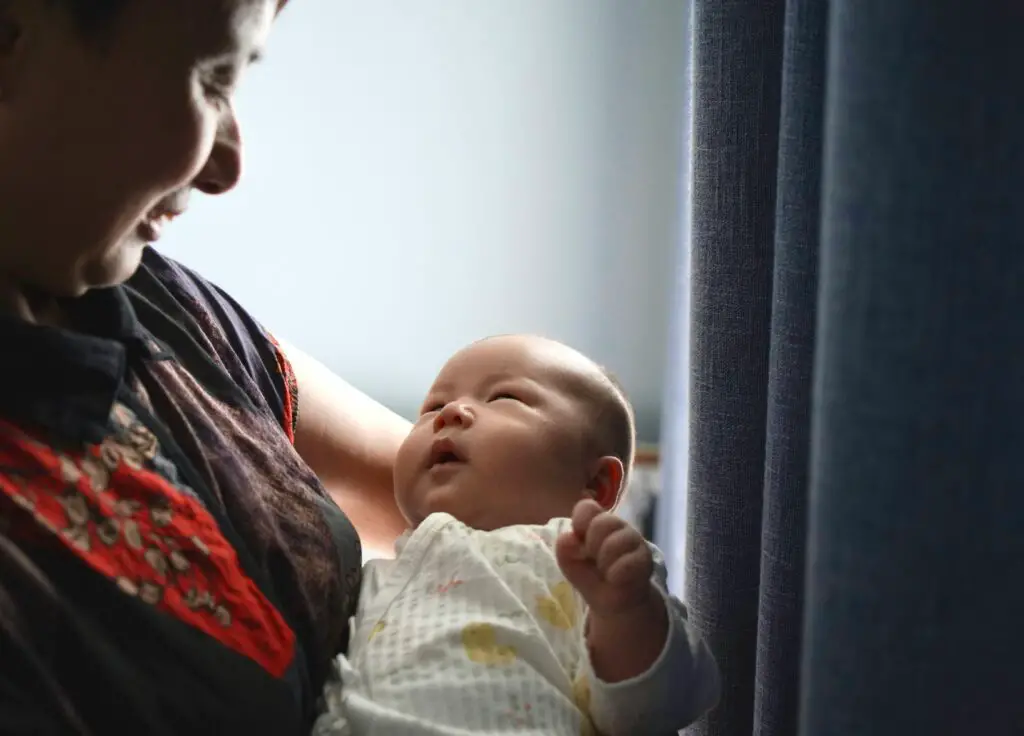1. Put Whiskey on Teething Gums

Some old magazines actually suggested rubbing whiskey on a baby’s gums to soothe teething pain. The thinking was that the alcohol would numb the area and help them sleep better. Parents back then likely didn’t think twice about it, but today, the advice sounds shocking. Giving alcohol to a baby, even in tiny amounts, can be very harmful to their development and health.
It’s wild to imagine a time when this tip was printed in respected parenting guides. These days, pediatricians recommend teething toys or cool washcloths instead of anything involving booze. Looking back, it’s a reminder of how much safer modern child care has become.
2. Let Babies Cry for Hours

One piece of advice repeated in many old parenting columns was to let infants “cry it out” for as long as it took. Parents were told not to “spoil” their babies by comforting them too quickly. The belief was that crying strengthened the lungs and made kids more independent.
While sleep training is still debated, leaving a newborn alone for hours is not something most doctors recommend anymore. The modern view sees crying as communication rather than manipulation. Thinking of parents listening to hours of wailing because of a magazine article feels heartbreaking today.
3. Put Kids Out in the Sun for Health

Decades ago, parents were told to let their babies spend time outside in direct sunlight, sometimes even stripped down to their diapers. The idea was that sunshine built strong bones and boosted overall health. This was long before people worried about UV exposure or skin cancer.
While vitamin D is important, modern experts suggest safe sun practices and supplements rather than hours of unprotected exposure. The thought of a baby baking in the midday sun as “doctor’s orders” makes us cringe now. It’s a perfect example of advice that aged very poorly.
4. Skip Hugs to Avoid Spoiling

Some parenting articles in the mid-20th century told moms and dads to limit affection. Hugs, kisses, and holding your baby too often were believed to create spoiled, needy children. Parents were even encouraged to only touch babies when feeding or changing them.
This kind of advice seems cruel by today’s standards. We now know that touch and closeness help babies feel secure and promote healthy development. It’s amazing to think there was ever a time when parents were discouraged from showing love.
5. Start Solids at Just a Few Weeks

Old magazines sometimes claimed babies could start on cereal or mashed potatoes as early as two to four weeks old. The advice came from the belief that infants would sleep better with “something solid” in their bellies. Ads for baby food companies often reinforced this notion.
Now, pediatricians recommend waiting until about six months before introducing solids. Feeding an infant mashed table food too early can cause choking or digestive problems. It’s one of those ideas that shows how much baby nutrition has changed.
6. Let Kids Play with Cigarettes

Believe it or not, some ads showed toddlers holding unlit cigarettes as a way of mimicking adults. The message was that it was “cute” or a sign of growing up. Parenting magazines sometimes framed this as harmless play.
Of course, we know better now. Not only is smoking dangerous, but the idea of encouraging kids to handle cigarettes feels unbelievable. Looking back, it’s jarring to see how normalized smoking was in family life.
7. Add Rice Cereal to Bottles

Another outdated tip was to thicken formula with rice cereal for babies who wouldn’t sleep through the night. Parents were told it would “stick to their ribs” and fill them up. It was printed so casually that many parents followed it without hesitation.
The problem is that adding cereal too early can pose a choking hazard and cause overfeeding. Today, doctors strongly discourage this practice. It’s surprising to realize how common it once was, and how long it stuck around.
8. Ignore Fevers Unless Extremely High

Old parenting guides sometimes suggested that a mild fever was nothing to worry about and should be ignored completely. Parents were told not to “fuss” unless the child’s temperature reached very high levels. The idea was that most fevers “burned out” illnesses naturally.
While it’s true fevers can be part of the healing process, brushing them off entirely is risky. Today, doctors emphasize watching for other symptoms and using caution, especially with young children. It’s advice that sounds careless now, but back then it was considered practical.
9. Put Babies to Sleep on Their Stomachs

For years, parents were encouraged to place babies on their stomachs for naps and bedtime. The reasoning was that it reduced the risk of choking if they spit up. It was such standard advice that entire generations grew up sleeping face-down.
Now, research shows that back-sleeping significantly reduces the risk of sudden infant death syndrome (SIDS). Campaigns like “Back to Sleep” completely reversed the old guidance. It’s one of the most dramatic turnarounds in parenting advice in modern history.
10. Give Kids Coffee to Keep Them Awake

A few quirky pieces of parenting advice suggested giving children coffee before long car trips or busy days. The idea was that caffeine would make them alert and less cranky. Some even claimed it could help with school performance.
The thought of a toddler sipping a cup of coffee sounds absurd now. Modern parents know caffeine can mess with sleep, hydration, and even heart health. It’s a reminder of how casually people once treated things we now consider off-limits for kids.
11. Punish Left-Handedness

In older parenting guides, left-handedness was often treated as a problem to fix. Parents were encouraged to train their kids to use their right hand, sometimes with punishments or strict correction. It was tied to outdated beliefs about conformity and even superstition.
Today, we know handedness is a natural variation and not something to correct. Forcing a child to switch hands can actually cause learning and coordination difficulties. Looking back, it’s hard not to feel sympathy for kids who went through this.
12. Put Babies in Ice-Cold Baths

Some parenting advice suggested plunging fussy or feverish babies into cold baths to “shock” their system. The thinking was that it would calm them down or reduce fevers quickly. In reality, it was a very unpleasant and sometimes dangerous method.
Modern parenting experts warn against this, noting that cold baths can cause shivering and distress without helping much. Safer remedies for fevers exist today, like proper hydration and careful monitoring. It’s a prime example of how harsh old remedies could be.
